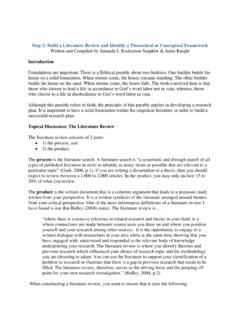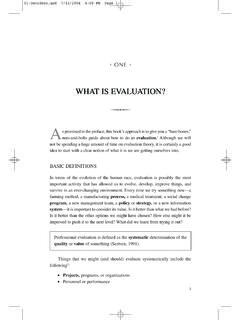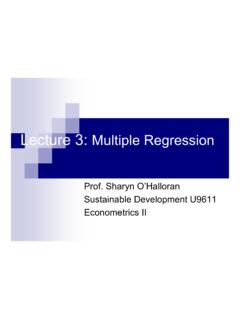Transcription of Step 7 Identifying Labeling and Defining Your Variables
1 Step 7: Identifying , Labeling , and Defining your Variables Written and Compiled by Amanda J. Rockinson-Szapkiw Introduction your Variables are introduced in your purpose statement, questions, and hypotheses, but it is also useful to identify each variable , to label it, and to define it. Topical Discussion: Types of Variables There are 6 basic types of Variables . 1. Independent Variables (Predictor Variables ) 2. Dependent Variables (Criterion Variables ) 3. Variables of Interest 4. Confounding (Control) Variables 5. Moderating Variables 6. Mediating Variables Independent Variables (Predictor Variables ) Independent Variables are Variables that affect, influence, or cause (or possibly cause) the outcome, the dependent variable .
2 They are the treatment, what is manipulated in a study, or the intervention that the researcher chooses to study. In a regression study, the independent variable is the predictor variable . Independent Variables are often, but not always, categorical in nature. That is, the researcher is usually interested in the presence versus the absence of a treatment or condition. Most research studies involve more one independent variable . Example: In the question we have been posing, Is the difference in the second grade students attitudes toward math as measured by the Attitudes Toward Mathematics Inventory who participate in the Math program as opposed to second grade students who participate in a traditional math class?
3 Let s identify our independent variable . Independent variable : type of program. Since we have both a treatment group, those participating in the Math program, and a control group, those participating in a traditional math course, our independent variable has 2 levels. Dependent Variables (Criterion Variables ) Dependent Variables are the Variables that are influenced by or depend upon the independent Variables . They are the outcomes or effects. They are the factors that are being observed or measured. Dependent Variables are often continuous in nature; that is, they have a value.
4 However, some researchers do measure dependent Variables that are discrete. A more in depth discussion about types of data is in the analysis lesson. Variables of Interest When considering the relationship between two Variables , deciding which is indepdnet and which is dependent can be arbitrary. As such, they can simply be referred to as Variables of interest. Let s look at this a little more in depth. In correlational research, the relationship between Variables is considered; whereas, in experimental research, we manipulate a variable and measure the effects of that manipulation on the other variable .
5 In a correlational study, we do not seek to prove causation . By definition, an independent variable is a factor that can be varied or manipulated. A dependent Variables value, according the mathematical texts, depends on the value of x or the independent variable . Thus, by definition, you can conclude that Defining Variables as independent or dependent in a correlational study does not seem appropriate. As such, the Variables in a correlation study that are not being manipulated can be labeled as Variables of interest rather than independent or dependent Variables .
6 Tips: When writing about a planned regression study, it is important to note when to use the terms independent variable and when to use the term predictor variable . Use the term independent variable when you as the research manipulate the variable . If you do not manipulate the variable for the study, then use the term predictor variable . Example: In the question we have been posing, Is the difference in the second grade students attitudes toward math as measured by the Attitudes Toward Mathematics Inventory who participate in the Math program as opposed to second grade students who participate in a traditional math class?
7 Let s identify our dependent variable . Dependent variable : attitudes toward math as measured by the Attitudes Toward Mathematics Inventory Tips: When writing about a planned regression study, it is important to note when to use the terms dependent variable and when to use the term criterion variable . Use the term dependent variable when you as the research conduct an experiment, manipulate the independent variable . If you do not manipulate any variable for the study, then use the term criterion variable . It is important to note that some research tests refer to the Variables in a correlational study as independent and dependent.
8 Although I prefer that researchers distinguish between Variables of interest and independent and dependent Variables , I usually recommend that students use the terminology consistent with the text they are citing to justify their statistical procedures. Confounding (Control) Variables Confounding Variables are Variables that influence the dependent variable . When a researcher knows that a confounding variable (s) is present, he or she should try to neutralize the effect of the variable (s). When the variable is controlled for it is controlled for, it is called a control variable .
9 The research may choose to control the variable in a variety of ways. For example, the research may try to make the variable constant by eliminating a certain population or characteristic within a population. If gender is a confounding variable , the researcher may choose to only study males. In the case of the parenting class example we have been considering, only fathers. If we were controlling for a variable in this manner, we would discuss it in the methods section. The research may also use a statistical analysis such as an analysis of covariance to control for the Variables influence.
10 As such, this type of confounding variable is called a control variable . Researchers often control for Variables such as age, gender, and ethnicity. If statically controlling for the variable , it should be noted in the hypothesis. Example: In the question we have been posing, Is the difference in the second grade students attitudes toward math as measured by the Attitudes Toward Mathematics Inventory who participate in the Math program as opposed to second grade students who participate in a traditional math class?, we may recognize that the gender of the student is likely to influence math motivation and identify it as a variable that needs to be statistically controlled.




